Meet the scholars advancing Afro-centric research and Black scholarship at TMU
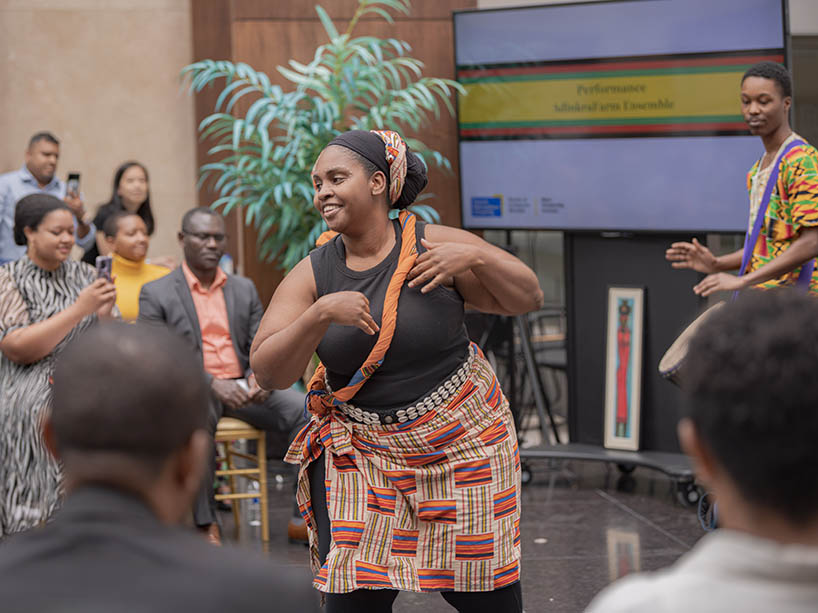
African dancers and drummers performing at the Postdoctoral Fellowship for Black Scholars Welcome Ceremony. Photo by Alyssa K. Faoro
Some of the world’s most important technological, social and creative advancements originate from Africa and its Black diasporas. From pioneering medical practices like surgical techniques and herbal remedies to significant contributions in the fields of mathematics, astronomy and architecture, the continent has accumulated an immense history of intellectual wealth. Over the years, revolutionary thinkers descending from the continent have built upon beliefs, practices and methodologies originating from African cultural groups and ancestral knowledge, sparking social change in the process.
Despite this, Black scholars remain disproportionately under-represented (external link) in academia and higher education in Canada. At TMU, although Black people make up roughly (PDF file) 10 percent (external link) of the population of Ontario, Black faculty only represented 3 percent of full-time tenure-stream faculty in 2020.
To address this and respond to recommendations of the (PDF file) Anti-Black Racism Campus Climate Review Report published by the Office of the Vice-President, Equity and Community Inclusion (OVPECI), TMU’s Presidential Implementation Committee to Confront Anti-Black Racism (PICCABR) launched the Postdoctoral Fellowships for Black Scholars program in December 2022. Housed within the Yeates School of Graduate Studies and funded through the PICCABR and the Office of the Provost, the program equips Black scholars with resources, guidance and funding to further their careers and expand Afro-centric, Black-led and Black-focused research and innovations.
In its inaugural year, the initiative received over 50 applications with fellowships awarded to four outstanding Black scholars: Joseph Adu, Teshager Kefale, Esa Dube Kerme and Ashley Jane.
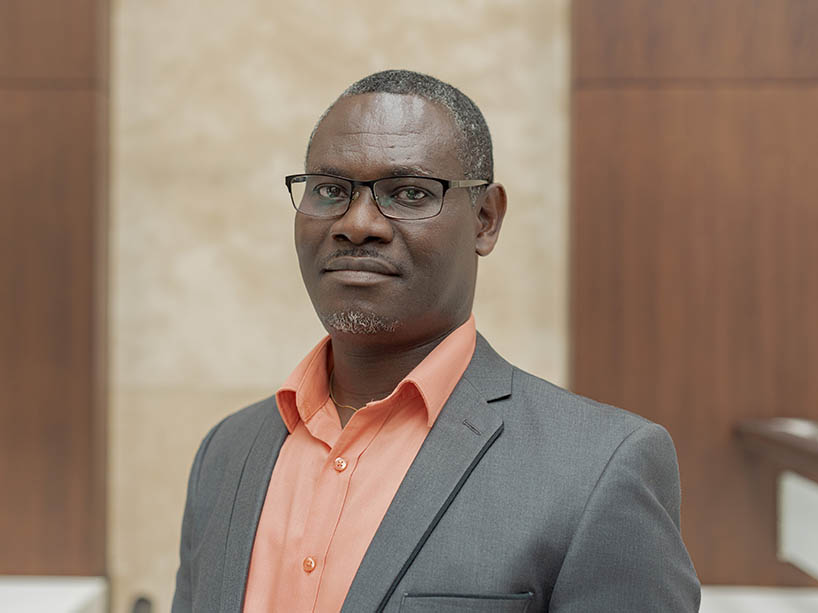
Joseph Adu, Postdoctoral Fellowship for Black Scholars fellow. Photo by Alyssa K. Faoro
Joseph Adu is a public health expert with particular research interests in the areas of Black mental health, stigma and maternal health care. In addition to holding a bachelor’s degree, two master’s degrees, a PhD and a diploma, Adu brings a wealth of Afro-centric knowledge and lived experience to his practice. His work builds on over 20 years of international experience in healthcare and educationnlcuding including health practice research out of Ghana.
This fellowship will allow Adu to respond to social and health disparities experienced by African, Caribbean and Black communities in Canada with a particular focus on mental illness and the specific intergenerational, socioeconomic and cultural barriers that work together to create poorer mental health outcomes for both Black Canadians and Black people in the Global South.
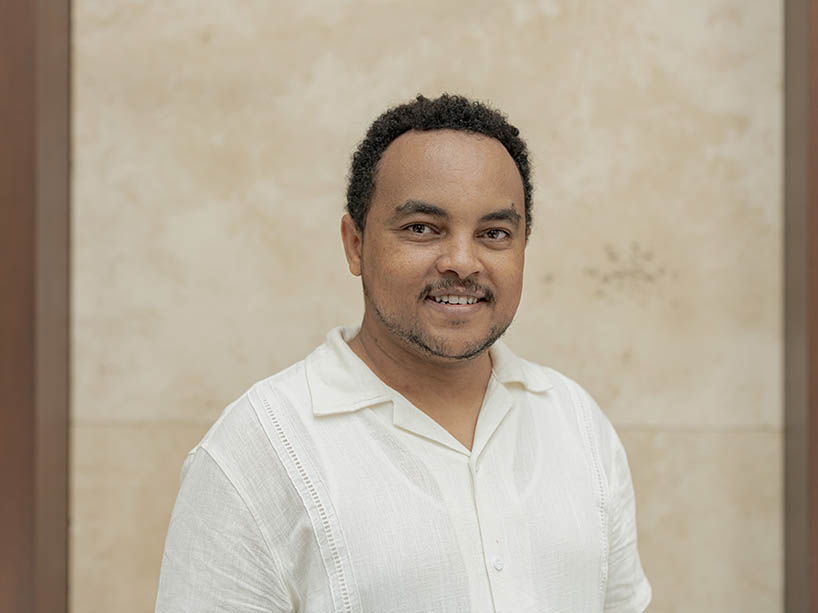
Teshager Kefale, Postdoctoral Fellowship for Black Scholars fellow. Photo by Alyssa K. Faoro
Teshager Kefale is a biochemist specializing in cancer research, biochemistry and synthetic biology. With a specific focus on breast cancer cells of African ancestry, Kefale brings forth a unique perspective to advancing the understanding and treatment of cancer through an equity lens.
Kefale’s work focuses on rectifying the historical underrepresentation of patients of African origin in cancer research. By investigating the specific biological and genetic factors of triple negative breast cancer in Black women, he aims to develop more tailored and effective treatments, ensuring that Black patients receive more equitable healthcare and health outcomes.
Under the guidance of his supervisor, Dr. Roberto Botelho, in collaboration with Dr. Costin Antonescu and with TMU’s MaRs Research Facilities’ resources, this fellowship enables Kefale to access the necessary support to contribute life-saving research.
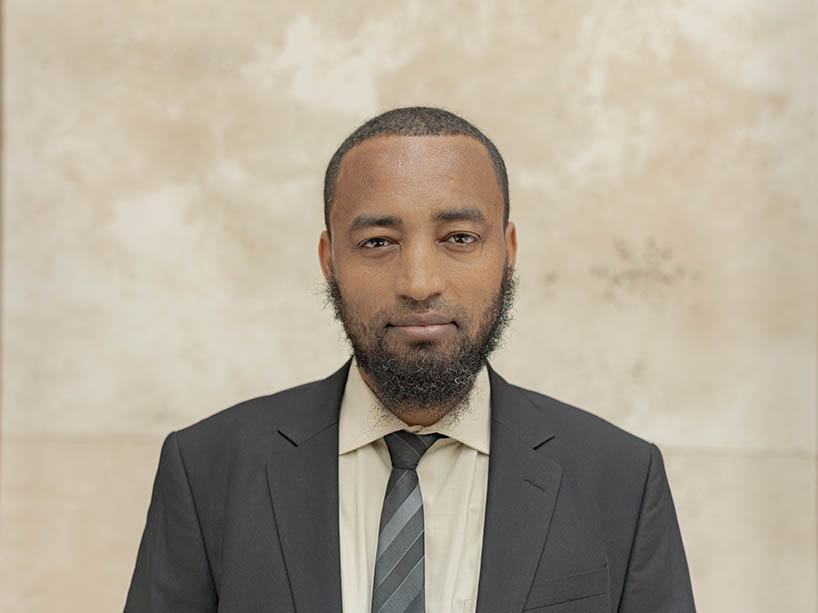
Esa Dube Kerme, Postdoctoral Fellowship for Black Scholars fellow. Photo by Alyssa K. Faoro
Esa Dube Kerme is a mechanical engineer with experience in thermal energy systems and computational heat transfer and fluid dynamics. His research, teaching and service, which have been published in top-tier journals and recognized through awards such as MIE’s Graduate Excellence Award and the Toronto Hydro Student Award, have offered significant contributions to the field of mechanical engineering.
Through this fellowship, Kerme will expand research in the field of renewable energies and thermal energy system optimization, exploring pathways to more progressive, sustainable futures in the process.

Ashley Jane Lewis, Postdoctoral Fellowship for Black Scholars fellow. Photo by Brandon Lewis
Ashley Jane Lewis is a new media artist and creative technologist whose work focuses on interactive installations, bio art, social justice and speculative design. Her artistic practice explores Black cultures of the past, present and future through computational and analog mediums including coding and machine learning, digital and physical fabrication, data weaving, microorganisms and live performance. Using science, Lewis draws inspiration from living organisms like slime mold, mycelium and other organic cultures to explore pathways to a more equitable future.
Listed in CIBWE’s top 100 Black Women to Watch (external link) , Lewis’ award-winning work is driving innovation and creating space for reimagined futures for marginalized groups has exhibited in both Canada and the US, most notably featured on the White House website during the Obama presidency. Lewis’ multi-species work was most recently featured (external link) in a series by Google for their Black Women Techmakers campaign (external link) . With well over a million views, this Webby Award winning series aims to show the diversity of creative, socially driven practices in technology.
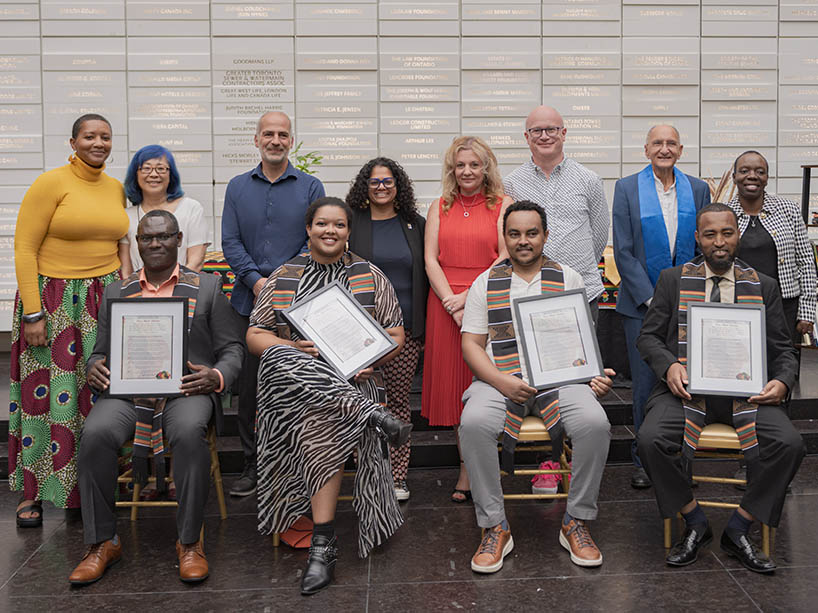
Front row from left: Joseph Adu, Ashley Jane Lewis, Teshager Kefale, Esa Kerme. Back row from left: Grace-Camille Munroe, Josephine Wong, Dean Kiaras Gharaghabi, Tanya De Mello, Roberta Iannacito-Provenzano, David Gauntlett, Anver Saloojee and Annette Bailey.
Learn more about the inaugural cohort of the Postdoctoral Fellowship for Black Scholars here.
TMU is privileged to welcome these bold thinkers. Ancestral knowledge and diverse ways of knowing is key to building bridges between Black past, present and futures. When enabling environments are created for Black scholars to explore their passions, tap into ancestral knowledge and flourish, incredible things can happen.
The inaugural cohort was welcomed at a ceremony hosted by the Faculty of Community Services and the Black Scholarship Institute, earlier this month. The ceremony included a collective honouring of Black ancestors facilitated by Elder Nene Kwasi Kafele as well as performances of African drums and dance by the AdinkraFarm Ensemble and spoken word delivered by Coco LaRain Viera.
In addition to celebrating the arrival of Adu, Kerme, Kefale and Lewis, the event offered a beautiful congregation of community. It brought together President Mohammed Lachemi, Roberta Iannacito-Provenzano, Dean Kiaras Gharaghabi, Dean Cory Searcy, Tanya De Mello, Anver Saloojee, Patrizia Albanese, Annette Bailey, Grace-Camille Munroe, David Gauntlett, Josephine Wong, Sara Berman and other members of the Faculty Working Group, adjudication committee and champions across the university instrumental in bringing this fellowship to life.
Towards Black flourishing at TMU
More representative faculty and postdoctoral scholars leads to more representative, inclusive and culturally competent learning environments and research solutions. The university’s commitment to increasing representation of Black faculty, Afro-centric scholarship and Black studies promises to drive thought leadership and innovation, promoting better outcomes for everybody.
According to data from the OVPECI’s most recent Employee Diversity Self-ID, 21 percent of all new full-time faculty hires at TMU identified as Black. In 2023, TMU witnessed a 2 percent increase of Black tenure-stream faculty since the publication of the Climate Review. This postdoctoral fellowship is the latest in a suite of holistic and interdisciplinary initiatives undertaken by the PICCABR Faculty Working Group to continue strengthening the pipeline of prospective Black faculty at TMU.
Visit the website for more information on the PICCABR’s work to confront anti-Black racism and cultivate Black flourishing at TMU.